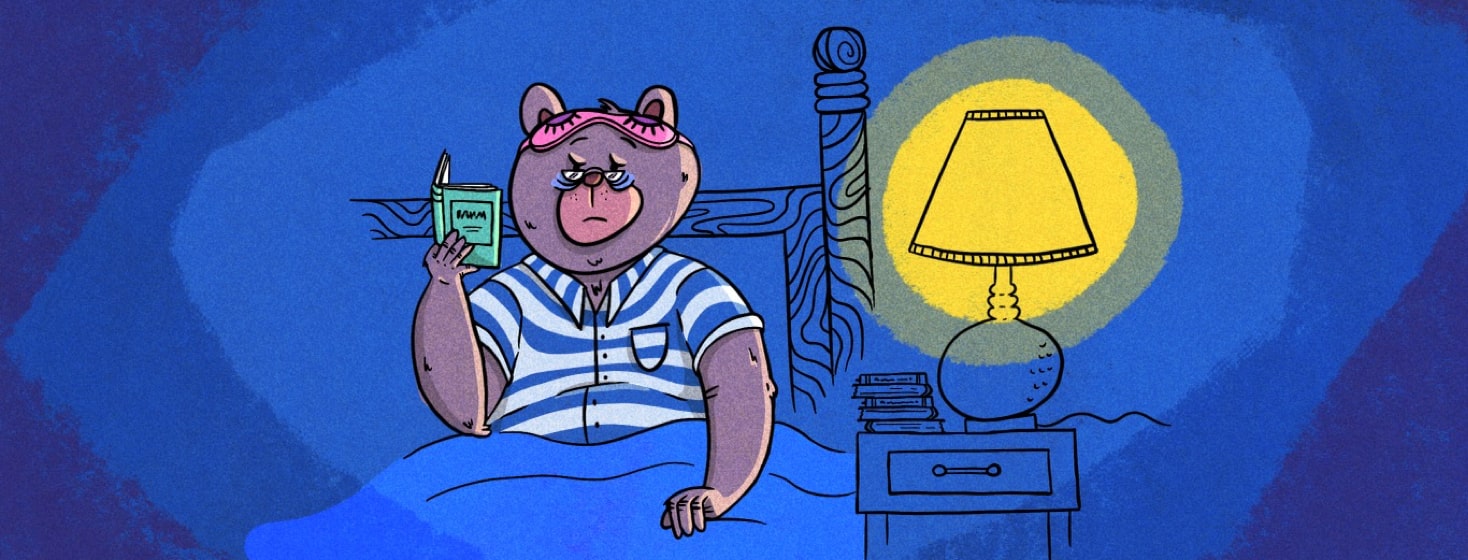Ask Our Health Leaders: Managing Insomnia and Sleep Problems in Narcolepsy
Insomnia, sleeplessness, and disturbed sleep are lesser-known symptoms of narcolepsy that many people in the community experience.1
Some people have found relief from their insomnia and other sleep problems with sleep meditation, exercise, and many other coping strategies.
We recently asked a few of our community Health Leaders how they manage these symptoms. Here's what they shared with us!
Managing insomnia and sleep problems
Q: If you experience symptoms of insomnia or sleeplessness at night, what do you do?
Tatiana Corbitt: If I can’t sleep at night, I will get up and crochet and drink tea, or drink tea and listen to a podcast until I am tired again. I try to avoid my phone because it will end up waking me up too much! If I am feeling extra energetic at night for some reason (it tends to happen at night more than the daytime, believe me) I will wash dishes, sweep, mop, or deep clean. I live in an apartment and I am sure my neighbors don’t like that! Roommates in the past have been confused by it, too.
Alyssa Walker: I don't experience symptoms of insomnia or sleeplessness at night because I use medication to help me sleep. I do experience waking up in the morning and wanting to go back to sleep but can't. It is a blessing and a curse. The blessing is that I can start my day early and get things accomplished. The curse is being tired and needing the sleep but can't fall asleep. I usually prefer to sleep longer, but I have accepted that my brain just doesn’t work that way.
Kerly Joy Bwoga: When insomnia gets worse than normal, it's very frustrating. I usually just try everything that worked in the past – so taking CBD gummies, putting castor oil on my eyelids, and playing white noise. I also play Scrabble on my phone. I have now been seen at an insomnia clinic and am awaiting therapy.
Lauryn Craine: When I experience insomnia, first I try to lay in bed for a bit. If I don't fall asleep in 30 minutes, I give up, because I usually fall asleep immediately. So, if it's taking too long, I know I’m not going to fall asleep. After that, I just stay up and work on my writing, read, or play video games. If I can't sleep, there’s no point in me trying to force myself. To me, I might as well do something interesting with the extra hours I have.
Choosing medication – or not – for better sleep
Q: Have you tried any medications, prescription or over-the-counter, to sleep better? Have they worked for you? Why or why not?
Tara O'Connor: Before my diagnosis, I tried several sleep medications, but they didn't work very well. They seemed to only help me fall asleep faster – but I still had disrupted nighttime sleep and did not wake up refreshed. After being diagnosed, I started taking Xyrem a few months after, and it ended up really changing my life. That was not the case at first, though. When my doctor first explained Xyrem to me, I was feeling very nervous and hesitant because of how she described it. I remember the first couple weeks of taking it, I was not getting much sleep because I had to figure out which dose was right for me.
Once I got to that right dose, I gradually started to feel more refreshed in the mornings and felt I could actually do things during the day. Before Xyrem, I was barely functioning. I missed a lot of school and even almost failed high school, and I couldn't keep a job. Now I am a full-time college student and have 2 part-time jobs. I graduate in May this year, which is so surreal, because looking back to when I was undiagnosed and not on Xyrem, I never would have thought I would be graduating with an associate’s degree.
Iris Vasconcelos: Last year, my insomnia was at its worst. At times, I could go up to 72 hours without a wink of sleep. The worst part about this was that it exacerbated my hallucinations to a frightening point. I desperately tried countless over-the-counter sleeping tablets but nothing worked. That is, until 1 pharmacist advised me to try these new melatonin sleep aid gummies. Although they still don’t help me to sleep a full night, they at least work enough to induce sleep for a minimum of 2 hours. For me, this is somewhat of a miracle. The only downside is that they can be quite expensive, but it’s worth it to get some much-needed sleep.
Alyssa Walker: I currently take Xywav to help me sleep better, and it has been such a positive experience. I take 2 doses a night, 1 right before bed and another about 4 hours later. Xywav has improved my narcolepsy symptoms drastically, especially for my cataplexy. I rarely experience cataplexy, and I used to have at least 3 episodes a day. In the past, I have tried melatonin for better sleep, but it was not helpful. I have heard of valerian root to help with sleeping through the night, but I have not tried it.
Tatiana Corbitt: I’ve tried Xyrem but had psychiatric and physical side effects, including a drop in hearing and permanent tinnitus – so Xyrem did not work for me. I am currently on baclofen and medical cannabis at night. These help me get a deeper sleep and also stay asleep for longer than I would without them. For example, without medications to sleep, I will wake up every half hour or so. With meds I can sleep up to 3 hours longer, which is a huge improvement.
Want to see more articles like this? Browse our collection of Community Views articles and read more stories and advice from the narcolepsy community by clicking the button below!

Join the conversation